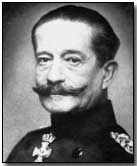Primary Documents - Proclamations of German Military Commander in Belgium, 1914
 Reproduced below are
extracts from two proclamations issued by General Ferdinand von Bissing, the German
Military Governor of Belgium, in August and December 1914.
Reproduced below are
extracts from two proclamations issued by General Ferdinand von Bissing, the German
Military Governor of Belgium, in August and December 1914.
The first of von Bissing's proclamations censured the Belgian public for its anti-German stance and for 'treacherously' attacking German soldiers in Belgium. The proclamation contained a threat of reprisals if such attacks continued.
The second proclamation similarly chastised the Belgian population for its anti-German sentiments, this time in supplying 'enemy' soldiers (i.e. from Allied countries) with chocolates. He reminded the Belgians that German prisoners-of-war in France could not expect to receive such 'dainties'; again, the populace was warned to mend its ways accordingly under pain of punishment.
Proclamations of General Baron von Bissing, German Military Governor of Belgium
Proclamation of 29 August 1914
As German Military Governor of Belgium he issued a Proclamation, dated August 29, 1914, which said in part:
If a blinded and maddened population treacherously attacks and slaughters without pity the brave sons of our people who are facing death for their country, as well as the wounded, doctors and hospital nurses - if bands of men endanger the safety of the lines of communication of the armies, self-preservation requires that extreme measures should immediately be adopted against them.
Indeed, it is a sacred duty of the military commanders to take such measures. In such a case the innocent will have to suffer with the guilty. The repeated instructions of the command of our army have allowed no doubt to subsist as to this matter.
It is no doubt to be regretted that in repressing these infamous acts it should be impossible to spare human lives, and that isolated houses as well as flourishing villages, and even entire towns, should be annihilated, but this should not provoke misplaced sentimentality.
All that we may destroy is, in our eyes, less in value than the life of a single one of our brave soldiers. That is self-evident, and indeed, properly speaking, it is not necessary to mention it.
Whoever speaks here of barbarity commits a crime. Rigorously to carry out a duty is to obey a mandate of a high civilization [Kultur], and in that matter the population of the enemy's country has only to take a lesson from our army.
Proclamation of December, 1914
In an order of the day, I recently appealed to the public not to display false and misplaced sentiments of sympathy towards the prisoners of war. You should show more of a German conscience.
Must I again repeat this remonstrance? It would seem so. According to the reports which have been submitted to me, all kinds of dainties, and in particular chocolates, have again been offered to the prisoners in spite of the prohibitions which have been issued, and that at Munster as well as elsewhere.
Are you so full of pity for others and so anti-German in spirit that you do not hear the cries of distress of our own prisoners in France? You may be sure that they are not offered chocolate there.
Unfortunately, it is not possible completely to isolate from the outside world the prisoners of my district. I have, therefore, been obliged to put an end to the commerce in provisions and dainties which has been established in the encampments without my authority.
It is mostly children and young people, and in particular little girls, who crowd round the prisoners unceasingly. They are entirely wanting in good breeding. It is for their relatives and the schools to alter this state of things.
If these warnings should remain without result, recourse will be had to exemplary punishment in order to put a stop to this anti-German conduct. It is on the sentiment of the young generation that the future of our country depends.
The General Commanding,
VON BISSING
Source: Source Records of the Great War, Vol. II, ed. Charles F. Horne, National Alumni 1923
"Plugstreet" was British slang to describe the Belgian village of Ploegsteert.
- Did you know?
